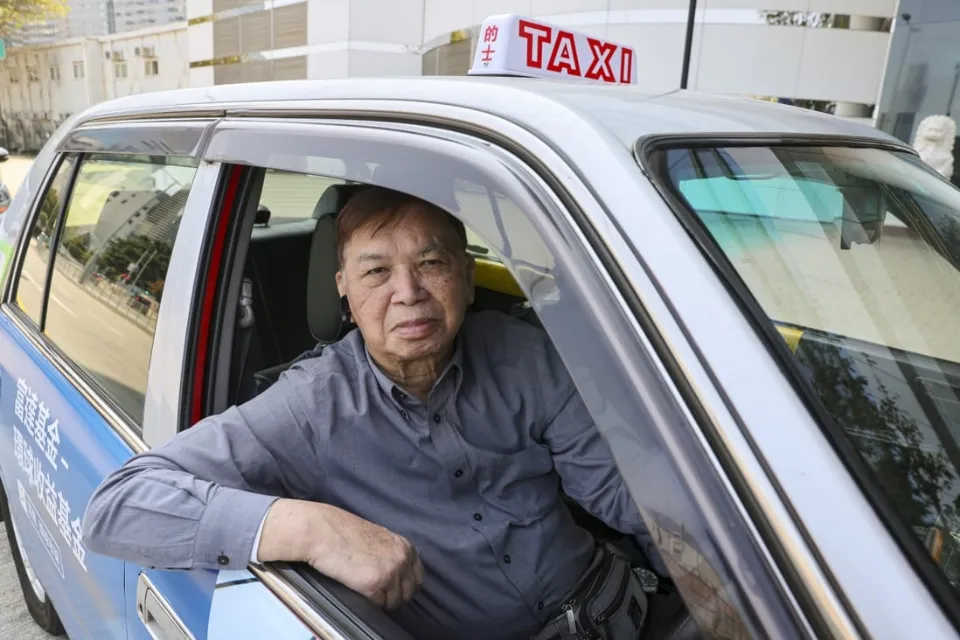Cheung Chiu-tung, a 73-year-old taxi driver who regularly gets behind the wheel to drive locals and visitors alike around Hong Kong while relying solely on his memory to determine the best route, decided that retirement would be too monotonous.
Cheung has been a cab driver for about 50 years and used to make about HK$10,000 (US$1,274) per month working full-time. In his 60s, he changed to part-time driving, working fewer days and taking the majority of the week off to rest.
Following Sunday’s accident involving an 85-year-old cabby, which left three pedestrians injured, including two in critical condition, the issue of taxi drivers’ age is once again in the news.
Cheung made the decision to retire, but after six months, he started to lose his mind and felt unhappy. His family physician advised him to go back to work in order to maintain his mental acuity.
“When I drive, I can exercise my brain by thinking and remembering the routes, and it also gives me a source of emotional support,” he said, adding his wife and two adult children supported his decision to go back to work.
Cheung, despite his advanced age, relied solely on his memory for navigation while driving. Furthermore, he claimed to be in good physical shape. Every year, Cheung pays to have a physical to make sure he is healthy enough to drive and isn’t endangering himself or his passengers.
He claimed that after explaining how driving had changed his life to curious passengers who questioned his age, their doubts began to fade as they reached their destination without incident.
When Cheung goes to renew his driver’s license in November of next year, retirement may still be in the cards.
“I am aware of the extent of my abilities. I don’t want to be a ‘time bomb’ on the road,” he said.
Recent incidents involving elderly taxi drivers on the roads have rekindled public concern about the city’s aging taxi fleet and prompted calls for authorities to review licensing requirements.
In the most recent incident on Sunday, a taxi driven by an 85-year-old man plowed through a busy street crossing, critically injuring two pedestrians and injuring three others.
Grassly inflicting bodily harm was the charge leveled against the driver. He was given bail by a judge on Tuesday, but his license was taken away.
By 2020, there were 1,444 more drivers with a taxi driving license who were 80 years of age or older than there were in 2018, according to government statistics.
Of the 203,027 licensed drivers in the city in 2020, there were 112,063 taxi drivers who were 60 years of age or older.
Taxi drivers in Hong Kong do not currently have a retirement age. However, applicants for new, reissued, or renewed licenses must at least once every three years provide a medical examination report if they are 70 years of age or older. A licensed physician or registered nurse must fill out and sign the report.
Although older drivers are a problem, taxi drivers and industry representatives acknowledged that the industry has long lacked young workers, while older drivers continue to work to support themselves and maintain their well-being.
Wong Po-keung, 76, continues to operate his taxi business in order to keep himself occupied and in contact with his coworkers and friends.
“You would be discouraged if you retired. But it would be different if you drive a taxi sometimes, meet your friends, and drink a cup of milk tea in a cha chaan teng,” he said.
Wong entered the field more than 50 years ago because it paid comparatively well at the time. In addition to driving cabs himself, Wong also runs a taxi service company with two cabs and 10 part-time drivers, all of whom are older than 65.
Most of his drivers, he claimed, came back to work after their spirits had fallen off during retirement. Driving allowed them to maintain their social connections, he claimed.
Additionally, he had trouble luring in younger drivers because they were put off by the industry’s low pay compared to that of driving buses and cargo trucks.
Wong, who is also the chairman of the Hong Kong Taxi Owners’ Association, warned against prejudice against elderly drivers because he claimed that not only senior cabbies were involved in accidents on the road. Instead of blaming old age, he said that many of the tragedies were caused by the poor driving habits and attitudes of some taxi drivers.
According to official statistics, there were 4,081 traffic accidents involving taxis in 2021, representing 23.2% of all accidents that year, up from 3,837 in 2017.
In 2021, 1,540 accidents involving taxi drivers aged 60 to 69 were reported, while 1,387 accidents involving drivers aged 50 to 59 were.
According to the statistics, 396 accidents involved drivers aged 70 to 79, while 13 accidents involved drivers 80 or older.
Driving at 80 mph or higher is not advised, according to Ng Kwan-sing, life president of the Taxi Dealers and Owners Association. However, he claimed that many elderly cab drivers continued to work in order to support themselves and their families, whereas younger generations were turned off by the long hours and a median monthly salary of about HK$20,000.
“The trend of ageing among the city’s taxi drivers has been worsening,” he said.
Ng proposed that officials set up flexible schedules for drivers and make physical exams freely available in clinics located throughout the city’s 18 districts.
Additionally, he urged the authorities to increase incentives for young people interested in the industry.
Dr. Cheng Chi-man, the head of the Hong Kong Medical Association, however, claimed that such a checkup, which should take place at least every three years, was far from adequate and that there were no clear regulations regarding the medical examinations.



